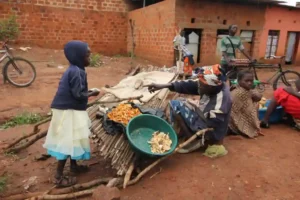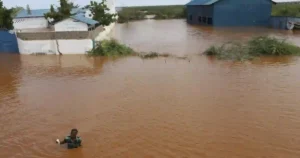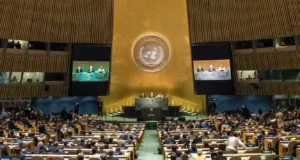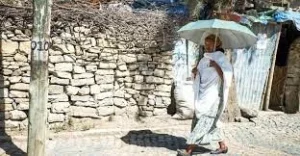Zambia is currently experiencing and tackling a serious humanitarian crisis due to frequent droughts, floods and heat waves driven by climate changes, this year. These disaster risks are affecting the poorest communities of the country, especially including the rural areas, which rely only on rainfall for agriculture purpose.
The dry spells are compounded by the El Nino effect and are driving the overall increasing severity of food insecurity. The IFRC and its membership aims to reach 476,448 people with the actions that is focused in improving food security, encourage positive hygiene and health behaviours and also improving the nutritional status of children under the age of five.

The devastated levels of hunger followed a protracted period of drought that has pushed up crime rates in Zambia’s hitherto ‘crime-free’ rural areas. According to the observers and victims, the social condition is unprecedented and caused for concern.
Reportedly, Webster Ntambo aged 35, is a small-scale farmer of Ntambo Village in Chief Liteta’s area in Chibombo district and has shred his horrific experience.
He said that he is already reeling from hunger and is suffering with double tragedy when village thieves broke into his house and stole all he was left with and that were only maize and mielie meal.
Ntambo said that they have stolen everything, even chickens. He planted 10 kgs of maize seed with the hope of harvesting enough for consumption and sale but reaped nothing due to drought.
He did not receive even a tin of maize and not even a cob to roast it and added that he is now stuck as he doesn’t have any money or resource to start anything, said Ntambo, a father of two kids.

Another person, Charity Ntambo aged 47, who is also the head woman of the village said that the recent drought is the worst in her memory.
He has never witnessed this kind of drought earlier and it is the worst drought he have ever experienced, where one can fail to get even a single bag of maize, said headwoman Ntambo.
Charity Ntambo then planted 20 kgs of seed and applied eight bags of fertilisers, from which she was expecting a yield of 100×50 kg bags of maize but received nothing due to drought. The headwoman declared that there is a serious hunger issue here. People are trying to survive on garden produced but it has been difficult for them.
The grave food crisis has forced women and girls into prostitution to afford a meal, increase the risk of HIV/AIDS, she added. Women are failing to feed their children, stated Ntambo.
We are hearing the cases of women destroying the marriages very frequently and parents are also failing to control the girl-child because of hunger in homes. We are trying hard to control the situation but it is not easy to handle.
Considerably, United Nations has activated an allocation of up to $5.5 million to support the response of Zambia to an unprecedented drought that has left about 7.5 million people in the 84 districts in need of assistance, with a majority including women and children.

According to the organisation, the funding is dependent on the fulfilment of required formalities by the UN agencies in Zambia, which are collaborating as a unified entity to support the government that led the initiatives in delivering humanitarian aid and lifesaving assistance to affected communities.
The funds will help in providing the emergency food aid by distributing clean and safe water, protection and delivering the healthcare services to address drought-related health risks, among other needs.
The support provided will also help to strengthen resilience in drought-affected communities to mitigate or avoid the humanitarian impacts of the drought and ensure that the emergency relief enhanced the sustainability.

Acting as UN resident coordinator in Zambia – Penelope Campbell has welcomed the support and underscored commitment by the UN in helping Zambia, responding to the drought emergency.
The drought has significantly impacted the eight of the country’s out of the ten provinces such as Central, Copperbelt, Eastern, Lusaka, Muchinga, North-Western, Southern and Western.
Notably, the most affected regions considered are Western, Southern, Central and Lusaka provinces and the most vulnerable groups that directly got affected include small-scale farmers which depend on rainfed agriculture, livestock herders and individuals reliant on natural waterbodies and shallow wells.

